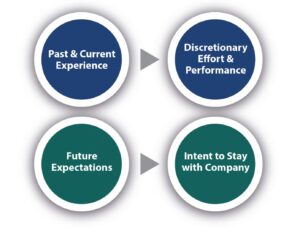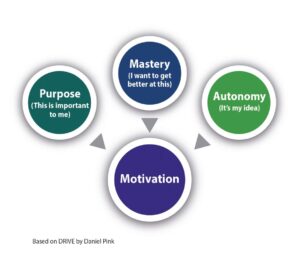How to Create a Culture of Growth and Career Development

Employee engagement and organisation culture are so intertwined that it is difficult to mention one without the other. And career development is the glue that binds the two together. If an organisation wants to engage its employees, the culture needs to support their professional growth.
Develop talent or risk losing it
Employee engagement is an idea that is widely accepted but loosely defined. An employee’s commitment to your company depends on two factors:
1. Past and current experiences (positive or negative) with their job, role and work environment. Every day, their experiences, interactions, work challenges and the culture of the organisation can make or break their commitment.
2. Future expectations about their job, career and your company as an employer. How the future looks and feels to your people is important. They are going to be as interested in whether they agree with the organisation’s vision and goals as they are in their own challenges and ambitions
 A lot of employee disengagement has to do with a disconnect between expectations versus reality. Every company I know promotes itself as offering great career progression. Yet research shows that 70% of employees are dissatisfied with future career opportunities at their organisation. A lack of future career opportunities is the primary driver of employee attrition. It even beats compensation and manager quality. We used to believe employees leave because of their managers. Now it seems they leave because of their careers.
A lot of employee disengagement has to do with a disconnect between expectations versus reality. Every company I know promotes itself as offering great career progression. Yet research shows that 70% of employees are dissatisfied with future career opportunities at their organisation. A lack of future career opportunities is the primary driver of employee attrition. It even beats compensation and manager quality. We used to believe employees leave because of their managers. Now it seems they leave because of their careers.
If you advertise your culture as supporting career development, you may hire rock stars. But if their experience is lack of growth, keeping them might prove to be difficult.
Your culture is not what is written on your website. It’s what employees live and experience every day. It is not about laying out a yellow brick road for employees to follow. It is about providing them with challenge and growth as part of their working life.
Career development is essential for motivation
In his best-selling book Drive, Daniel Pink highlights research into motivation. He states that it stems from purpose, mastery, and autonomy. In situations where people are paid fairly, this trio drives, engages and stimulates them to do their best work.

This is important to me. People who find purpose in their work are the most motivated. Purpose is what gets them out of bed in the morning and into work without groaning and grumbling – something that they can’t fake.
I want to get better at this. Mastery describes our natural wish to get better at doing things. It’s why learning a language or an instrument can be so frustrating at first. If you feel like you’re not getting anywhere, your interest flags and you may even give up. A sense of progress, not just in our work but in our abilities, contributes to our inner drive.
It’s my idea. Autonomy reflects our natural inclination for self-direction. We’re all built with inner drive, so we don’t want someone else telling us what to do unless we ask them.
We spend upwards of 40 hours per week working. In fact, some of us may even work 70 or 80-hour weeks depending on the culture of our industries or specific workplaces. Achieving purpose, mastery, and autonomy through our work is critical if we are going to stay motivated.
Focus on growth, not promotion
Traditionally, career development assumed promotion into a new role. Employees would move up the ladder as vacancies arose. There was little cross-functional movement.
With flatter structures and fast-growth, organisations can no longer support that model. Instead, the focus should be on growth. Help employees build and grow their capabilities through planned moves – lateral, vertical, within a function and across functions. By basing these moves on business needs you achieve a win-win solution for both organisation and employee.
To create a culture of growth, career development needs to be a partnership between the organisation and employee. That means:
-
Senior leaders championing career development. Having senior leaders articulate the value of career development is critical. As role models, the stories they tell of their own career development are incredibly powerful. By taking collective ownership, they create a proactive brokerage for sharing talent across the organisation.
-
Providing employees with the training and support to take ownership for their career development. Individuals need to take ownership of their careers but will need help to do that.
-
Training managers to have effective career conversations. One of the engines of a growth culture is the career conversation. There needs to be an ongoing dialogue between managers and employees.
-
Designing careers around experiences not positions. Traditional career paths focus on positions linked in a linear fashion. The focus is on the destination and there is an implicit promise of ongoing promotions. This progression is unrealistic in today’s environment and inflexible in the face of constant change. To grow employees with theorganisation, design careers around experiences emphasising the path as much as the destination.
-
Defining progression as capability development instead of changes in job grade or title. Traditionally, employees judge their career progression through changes in grade or title. But most organisations can’t offer lots of opportunities for upward progression. It is more difficult to get promoted today than it was five years ago. Capability development focuses on an employee’s progress in gaining skills, knowledge, and experience. These are achievements and personal attributes that will contribute to success in his or her career. Capability development creates a more flexible and higher-quality workforce. At the same time, it increases employee career satisfaction.
How well does your organisation support growth and career development?
Download your free ebook “It’s Good to Talk: A Practical Guide to Career Conversations in the Workplace.”